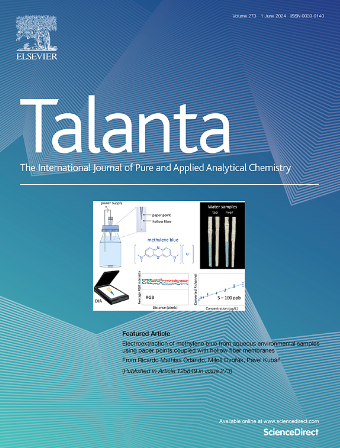Electrochemical immunoplatform for the quantification of epithelial extracellular vesicles applied to prostate cancer diagnosis
IF 5.6
1区 化学
Q1 CHEMISTRY, ANALYTICAL
引用次数: 0
Abstract
Prostate cancer (PCa) is the second most commonly diagnosed cancer in men worldwide, and its early detection is critical for improving patient outcomes through timely and effective treatment. In this work, we present the first electrochemical immunoplatform based on magnetic microbeads (MBs) for the determination of epithelial extracellular vesicles (EpEVs), which are emerging as promising biomarkers for PCa diagnosis and prognosis. The immunoplatform employs MBs functionalized with anti-EpCAM antibodies to selectively capture EpEVs, forming sandwich-type immune complexes that are detected via amperometry at disposable screen-printed carbon electrodes. The method demonstrated a detection limit of 0.4 ng μL−1 of EpEVs obtained from PC-3 cell line's culture, excellent reproducibility (coefficient of variation <5 %), and high selectivity against potential interferences. Comparative analysis with colorimetric immune-magnet ELISA test showed a strong correlation between the two methods, confirming the reliability of the proposed approach. Furthermore, the electrochemical platform provided better precision and a lower limit of detection than the immune magnet ELISA method, indicating its superior analytical performance. Clinical validation using patient samples revealed that the combination of EpEV detection with PSA levels significantly improves the sensitivity and specificity of PCa diagnosis. This novel immunoplatform represents a promising analytical tool for early detection and monitoring of PCa, with potential applications in personalized cancer management.

前列腺癌(PCa)是全球第二大最常确诊的男性癌症,其早期检测对于通过及时有效的治疗改善患者预后至关重要。在这项工作中,我们首次提出了基于磁性微珠(MBs)的电化学免疫平台,用于测定上皮细胞外囊泡(EpEVs),EpEVs 正在成为 PCa 诊断和预后的有前途的生物标志物。该免疫平台利用抗 EpCAM 抗体功能化的 MBs 选择性地捕获 EpEV,形成夹心型免疫复合物,通过一次性丝网印刷碳电极上的安培计进行检测。该方法对从 PC-3 细胞系培养液中获得的 EpEVs 的检测限为 0.4 ng μL-1,重现性极佳(变异系数为 5%),对潜在干扰具有高选择性。与比色免疫-磁性酶联免疫吸附试验的比较分析表明,这两种方法之间具有很强的相关性,证实了所提议方法的可靠性。此外,与免疫磁性 ELISA 方法相比,电化学平台具有更高的精确度和更低的检测限,表明其分析性能更优越。使用患者样本进行的临床验证表明,将 EpEV 检测与 PSA 水平相结合可显著提高 PCa 诊断的灵敏度和特异性。这种新型免疫平台是一种很有前途的分析工具,可用于 PCa 的早期检测和监测,并有望应用于个性化癌症管理。
本文章由计算机程序翻译,如有差异,请以英文原文为准。
求助全文
约1分钟内获得全文
求助全文
来源期刊

Talanta
化学-分析化学
CiteScore
12.30
自引率
4.90%
发文量
861
审稿时长
29 days
期刊介绍:
Talanta provides a forum for the publication of original research papers, short communications, and critical reviews in all branches of pure and applied analytical chemistry. Papers are evaluated based on established guidelines, including the fundamental nature of the study, scientific novelty, substantial improvement or advantage over existing technology or methods, and demonstrated analytical applicability. Original research papers on fundamental studies, and on novel sensor and instrumentation developments, are encouraged. Novel or improved applications in areas such as clinical and biological chemistry, environmental analysis, geochemistry, materials science and engineering, and analytical platforms for omics development are welcome.
Analytical performance of methods should be determined, including interference and matrix effects, and methods should be validated by comparison with a standard method, or analysis of a certified reference material. Simple spiking recoveries may not be sufficient. The developed method should especially comprise information on selectivity, sensitivity, detection limits, accuracy, and reliability. However, applying official validation or robustness studies to a routine method or technique does not necessarily constitute novelty. Proper statistical treatment of the data should be provided. Relevant literature should be cited, including related publications by the authors, and authors should discuss how their proposed methodology compares with previously reported methods.
 求助内容:
求助内容: 应助结果提醒方式:
应助结果提醒方式:


